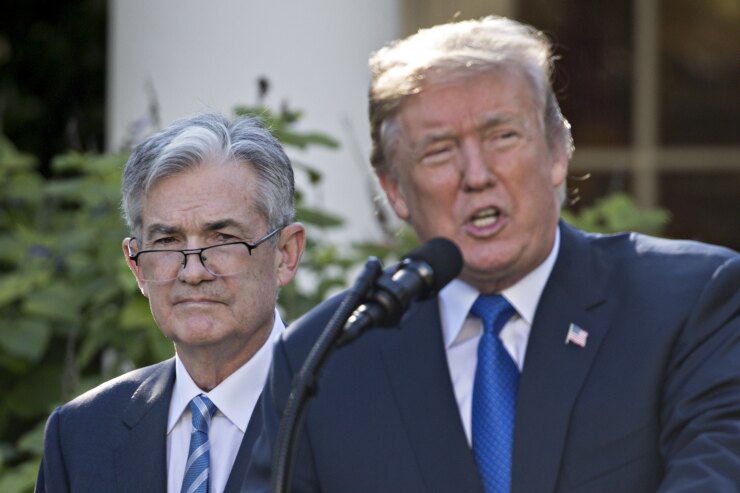
Financial markets breathed a sigh of relief in response to assurances from President Donald Trump that he would not try to remove the head of the Federal Reserve and that ultra-high tariffs against China would be lowered "substantially."
Trump's comments, delivered during a press event Tuesday evening, sparked a rally for key indexes and bank stocks in particular in after-hours and early morning trading.
The KBW Bank Index surged as much as 5.6% in early trade and was up around 3% by midday Wednesday. The tech-heavy Nasdaq composite was similarly up just under 3%, while the the S&P 500 was up about 2%.
Similarly, 10-year Treasury note yields were down slightly. Because bond yields move in the opposite direction as prices, the lower return rates indicate a stronger demand for U.S. debt.
In response to reporters' questions, Trump said he had "no intention" of removing Fed Chair Jerome Powell from office. The comment came one day after the president called for "preemptive cuts" to the federal funds rate and less than a week after he posted on social media that "Powell's termination cannot come fast enough!"
On Tuesday, Trump dismissed media reports that he and his top economic advisors were exploring whether they could fire Powell — something that the Fed chair has maintained is not permissible under the law. Trump said has no plans of attempting removal.
"None whatsoever. Never did. The press runs away with things," Trump said. "No, I have no intention of firing him."
After
"Well look, I think the president has made his position on the Fed and on Powell quite clear," Leavitt said. "The president believes that they have been making moves and taking action in the name of politics rather in the name of what's right for the American economy."
Trump's comments sent stock and bond prices tumbling amid investor concerns about the independence of the Federal Reserve and the potential loss of Powell, who is viewed as a steady hand on the economy.
Yet, despite his assurances against that, the president made clear that he will continue to make his monetary policy preferences known.
"I would like to see [Powell] be a little more active in terms of his idea to lower interest rates. It's a perfect time to lower interest rates," Trump said. "If he doesn't, is it the end? No, it's not. But it would be good timing. It should have taken place earlier. But no, I have no intention to fire him."
Powell and other Fed officials have said they will not adjust monetary policy until they have a clearer view of how new policies — primarily those relating to trade, but also immigration, regulation and government spending — will impact the U.S. economy.
Fed independence has been a frequent topic of conversation among policymakers and analysts in recent months, both because of the president's commentary on monetary policy and because of the administration's efforts to curtail agency independence.
Officials from the Fed have said repeatedly that their congressional charter protects them from executive oversight and that political commentary has no impact on their decision-making.
"Politicians all the time offer their opinions about what they think monetary policy should be," Federal Reserve Bank of Minneapolis President Neel Kashkari said during a Tuesday speaking engagement. "Our job at the Fed is to make the best decisions we can. We're not perfect, but make the best decisions we can based on data and rigorous analysis."
Last week,
"We're never going to be influenced by any political pressure," he said. "People can say whatever they want. That's fine. That's not a problem. But we will do what we do strictly without consideration of political or any other extraneous factors."
During that same event — the swearing of Paul Atkins as chairman of the Securities and Exchange Commission — Trump also attempted to assuage concerns about the budding
"It will come down substantially, but it won't be zero," he said.
Elsewhere in the Trump administration, special advisor Elon Musk said he would spend "significantly" less time on government duties starting next month. Currently, Musk oversees the so-called Department of Government Efficiency, a special audit group tasked with slashing government spending and reducing the federal workforce.
Musk made the announcement during the earnings call for Tesla, one of several companies he owns and serves as chief executive. The electric car maker has seen its stock value and profits slide in recent months as Musk's association with the White House has sparked a backlash against the company and its products.
Still, Musk told investors he would spend one or two days per week on government work, "for as long as the president would like me to do so."





